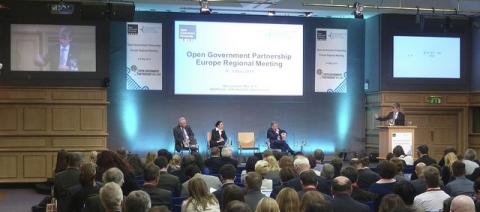Rotating into the Future: The Challenges and Opportunities of Changing Leadership
A dramatically different Open Government Partnership (OGP) steering committee will meet next in September in New York. Following decisions taken at this month’s meeting in Indonesia, the total number of committee members will increase from 18 to 22 (11 government representatives and 11 civil society representatives). Of those, as a result of the scheduled rotation, around half may be new to the committee. This presents a particular challenge and a tremendous opportunity.
OGP was formed by the dedication and commitment of a handful of like-minded reform champions who were brought together to chart a course for the new initiative. The current OGP steering committee has set a particular tone and a set of dynamics—one that has been productive, positive, and at times even fun, but perhaps one to which we have grown too accustomed. Issues are debated, and we strive for consensus in the spirit of building shared understanding, but we shy away from voting on critical issues, allowing a veto that constipates the process; domestic and foreign politics collide, at times awkwardly prohibiting forward movement. And critical but prickly issues such as how best to protect civic space within OGP are bogged down in prolonged review processes.
There are critical challenges in the path of the OGP. The first challenge is for us to identify leaders for the new steering committeeThe Steering Committee is OGP’s executive decision-making body. Its role is to develop, promote and safeguard OGP’s values, principles and interests; establish OGP’s core ideas, policies, and ru... from both civil society and government – strategic thinkers who see the opportunity OGP presents and the obstacles ahead, and who can help craft a future path. The committee work is often not glamorous; it is late night and early morning calls, furious email chains and careful word-smithing. We need new, strong voices who will help lift our sights beyond the pedantic paper pushing and protocol and focus on how to bolster the credibility of the partnership and uphold the principles and values of OGP.
The second challenge is for us to take hard decisions that strengthen the integrity of the partnership. Without a rapid response policy, the OGP steering committee has no way to address challenges that drive at the heart of OGP – like civil society engagement. Thanks to the hard work of the criteria and standards sub-committee, we are close to a new policy. With some legal review and further consultation, we should have a way forward. But such policies, and action guided by those policies, cannot be further delayed.
A third challenge is to ensure that the leadership, not only within the steering committee but also nationally, harnesses the potential of OGP to make advancements internationally. This involves considering our role not just within countries, but across them. To encourage peer learning and exchange, to use international and regional fora to advance the principles of transparencyAccording to OGP’s Articles of Governance, transparency occurs when “government-held information (including on activities and decisions) is open, comprehensive, timely, freely available to the pub... More and citizen engagement, and to build our collective knowledge of what it takes to be truly open and participatory. We have many opportunities to do so – including through the post 2015 MDG processes and the forthcoming G20 meeting.
These challenges are not insurmountable, but they must be carefully and seriously addressed in order to ensure that the gains we have made – more than 65 countries committing to the partnerships, and nearly a quarter of national commitments assessed by the independent reporting mechanisms as being completed and ambitious – are only enhanced in the future.
The Revenue Watch Institute – Natural Resource Charter is a non-profit policy institute and grantmaking organization that promotes the effective, transparent and accountable management of oil, gas and mineral resources for the public good. Through capacity buildingEnhancing the skills, abilities, and processes of public servants, civil society, and citizens is essential to achieving long-lasting results in opening government. Technical specifications: Set of ac..., technical assistance, research and advocacy, we help countries realize the development benefits of their natural resource wealth. RWI-NRC’s Deputy Director, Suneeta Kaimal, is the civil society support co-chair of the OGP.

